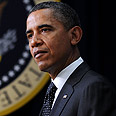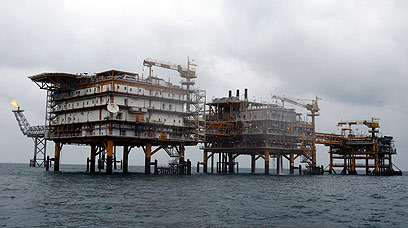
'White House pushes to weaken Iran sanctions'
Obama administration pressuring Congress to ease impact of financial restrictions, arguing they would push up oil prices, boost Iran's economy
The Obama administration is pressuring Congress to ease the potential impact of crippling sanctions on Iran's Central Bank, arguing that the restrictions will drive up oil prices and wind up being a boon for Tehran and its pursuit of a nuclear weapon.
In a plea to House and Senate negotiators writing a broad defense bill, the administration has asked for substantive changes to a provision that would target foreign financial institutions that do business with the Central Bank of Iran, including a six-month delay for all the penalties. But the chief sponsors of the sanctions, which the Senate resoundingly backed last week on a 100-0 vote, are resisting the request.
Related stories:
- US launches 'virtual' embassy for Iran Russia: UN sanctions on Iran have been 'exhausted' Iran sanctions pose legal conundrum for expats
In a letter late Monday to House and Senate negotiators, Sens. Mark Kirk, a Republican, and Bob Menendez, a Democrat, pleaded with them to leave the sanctions intact.
The penalties are "tough, responsible and, most importantly, bipartisan," the two lawmakers wrote. "It provides the administration another key tool to curb Iran's pursuit of nuclear weapons, while keeping oil markets stable and encouraging other nations to reduce Iranian oil purchases. With the support of every single United States senator, it needs no alternations."

Iranian oil-rig (Photo: EPA)
Lawmakers said they hope to complete work on the massive, $662 billion defense bill by the end of the week.
Tougher sanctions against Iran have widespread support in Congress, reflecting concerns not only for US national security but also ally Israel's as well. Two weeks ago, the Obama administration announced a new set of penalties against Iran, including identifying for the first time Iran's entire banking sector as a "primary money laundering concern." This requires increased monitoring by US banks to ensure that they and their foreign affiliates avoid dealing with Iranian financial institutions.
But lawmakers in the House and Senate have pressed ahead with even tougher penalties despite reservations by the administration. Lawmakers cited the recent International Atomic Energy Agency report that Iran is suspected of clandestine work that is "specific to nuclear weapons," its alleged role in the plot to assassinate the Saudi ambassador in the United States and the attack on the British Embassy in Tehran.
"If this brutal and terrorism-sponsoring regime achieves this goal, if Iran gets the bomb, we in the US and freedom-loving nations around the world would have failed what is our generation's greatest test for securing the 21st century," Kirk said Tuesday at a forum sponsored by the American Enterprise Institute.
The Kirk-Menendez measure added to the defense bill would target foreign financial institutions that do business with the Central Bank of Iran, barring them from opening or maintaining correspondent operations in the United States. It would apply to foreign central banks only for transactions that involve the sale or purchase of petroleum or petroleum products.
The sanctions on petroleum would only apply if the president, in six months, determines there is a sufficient alternative supply and if the country with jurisdiction over the financial institution has not significantly reduced its purchases of Iranian oil. It also allows the president to waive the penalties based on national security.
- Receive Ynetnews updates directly to your desktop










